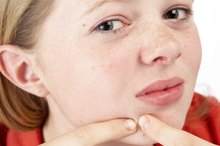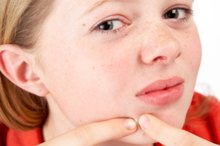Diabetic Skin Acne
Patients who have diabetes and acne often have difficulty getting their acne under control, and in some cases a bad case of acne can be one of the first visible signs of developing diabetes. Because the high blood sugar levels found in diabetes also have been implicated in acne formation, many clinicians are not surprised that the two could be related.
Significance
Acne, which is caused by blocked skin follicles that lead to pimples and inflammation, is most common in adolescence due to changing hormonal levels. However, many people with diabetes and other metabolic diseases continue to suffer from mild, moderate and severe acne well beyond adolescence due to hormonal imbalances. In addition, diabetes affects the skin's ability to heal itself, meaning lesions that appear take longer to heal and often recur. A severe case of acne in a patient older than 40 should trigger a physician to test for diabetes. Acne appears to be associated with both Type 1 (insulin-dependent) and Type 2 diabetes, and up to one-third of diabetes patients suffer from acne or another skin condition.
- Acne, which is caused by blocked skin follicles that lead to pimples and inflammation, is most common in adolescence due to changing hormonal levels.
- Acne appears to be associated with both Type 1 (insulin-dependent) and Type 2 diabetes, and up to one-third of diabetes patients suffer from acne or another skin condition.
Treatment
Yasmin Birth Control & Acne
Learn More
Some newly diagnosed diabetics may find that their acne clears up on its own, but moderate and severe cases--or cases not responsive to basic soap-and-warm water treatment--might require some extra treatment. Young adults at DiabetesForums.com emphasized moisturizing the face, which might seem counterintuitive, and also recommended using milder treatments to avoid irritating the skin. In some cases, a physician may prescribe antibiotics such as tetracycline or erythromycin in an attempt to clear up the infection underlying the pimples.
Natural Treatment
Diabetics also can consider natural treatments such as dietary changes for acne, although they should consult their physician beforehand. Many otherwise healthy acne sufferers have found relief by following a low-glycemic diet (a diet that doesn't spike blood sugar levels), and diabetics have been found to benefit from such a diet as well. An analysis of medical studies performed at the University of Sydney in Australia concluded that choosing low glycemic index foods has a small but clinically useful effect on blood sugar control in patients with diabetes. Meanwhile, a study from RMIT University in Melbourne, Australia linked positive skin changes with a low glycemic index diet in patients with acne.
- Diabetics also can consider natural treatments such as dietary changes for acne, although they should consult their physician beforehand.
- Many otherwise healthy acne sufferers have found relief by following a low-glycemic diet (a diet that doesn't spike blood sugar levels), and diabetics have been found to benefit from such a diet as well.
Skin Care
Are Brown Rice and Sweet Potatoes Good for Acne?
Learn More
Skin infections and other disorders are common in diabetes, and diabetics must take special care to avoid complications. In cases of acne, which already involves infection by the bacteria Propionibacterium acnes (P. acnes), more severe infections are possible without proper hygiene and skin care. The National Institute of Diabetes and Digestive and Kidney Diseases (NIDDK) recommends washing skin with a mild soap and using a lotion or cream afterward. In addition, diabetics--and especially those with acne--should drink lots of water, because water intake is critical in diabetes and low water intake also has been linked to acne.
- Skin infections and other disorders are common in diabetes, and diabetics must take special care to avoid complications.
- In addition, diabetics--and especially those with acne--should drink lots of water, because water intake is critical in diabetes and low water intake also has been linked to acne.
Accutane and Diabetes
The prescription the oral medication Accutane (isotretinoin) commonly is used to treat severe cases of acne. However, patients with diagnosed diabetes should be especially careful in choosing Accutane; the drug's manufacturer warns it can cause blood sugar fluctuations. "Patients with diabetes or a family history of diabetes may experience problems with the control of their blood sugar during isotretinoin therapy. Therefore, known or suspected diabetics should have periodic blood sugar determinations," says drug maker F. Hoffman-La Roche Inc. In addition, there are anecdotal reports of a possible link between Type 1 diabetes and Accutane use, although medical science has not yet substantiated such a link.
- The prescription the oral medication Accutane (isotretinoin) commonly is used to treat severe cases of acne.
- Therefore, known or suspected diabetics should have periodic blood sugar determinations," says drug maker F. Hoffman-La Roche Inc.
- In addition, there are anecdotal reports of a possible link between Type 1 diabetes and Accutane use, although medical science has not yet substantiated such a link.
Related Articles
References
- Sutaria AH, Masood S, Schlessinger J. Acne Vulgaris. [Updated 2019 Dec 13]. In: StatPearls [Internet]. Treasure Island (FL): StatPearls Publishing; 2019 Jan-. Available from: https://www.ncbi.nlm.nih.gov/books/NBK459173/
- Kraft J, Freiman A. Management of acne. CMAJ. 2011;183(7):E430-5. doi:10.1503/cmaj.090374
- Sutaria AH, Masood S, Schlessinger J. Acne Vulgaris. [Updated 2019 Dec 13]. In: StatPearls [Internet]. Treasure Island (FL): StatPearls Publishing; 2019 Jan-.
- American Academy of Dermatology. WHAT CAN CLEAR SEVERE ACNE?
- Cleveland Clinic. Rosacea (Adult Acne). Last reviewed October 10, 2019.
- American Academy of Dermatology. IS SPORTS EQUIPMENT CAUSING YOUR ACNE?
- American Academy of Dermatology. I HAVE ACNE! IS IT OKAY TO WEAR MAKEUP?
- Zaenglein AL, Pathy AL, Schlosser BJ, Alikhan A, Baldwin HE, et. al. "Guidelines of Care for the Management of Acne Vulgaris." Journal of the American Academy of Dermatology; 2016. 74(5):945-73.
Writer Bio
J.M. Andrews has been a professional journalist for more than 20 years. She specializes in health and medical content for consumers and health professionals. Andrews' background in medicine and science has earned her credits in a wide range of online and print publications, including "Young Physicians" magazine.









